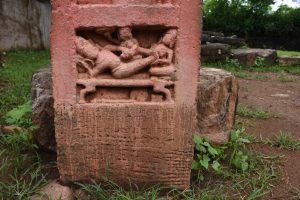INIG1177a Indor Inscription of VS 1177

Indor (District Guna). Hero-stone pillar inscription of VS 1177 (INIG1177a)
INIG1138 Kadwāhā Inscription of VS 1138
INIG1138 Kadwāhā (Guna). On a loose slab in the ruins of the maṭha. 4 lines, nāgarī, Hindi. Broken and not legible.
INIG1132b Bhadia Inscription of VS 1132b
INIG1132b Bhadia Khoh (Guna). Find spot not recorded. Number of lines not recorded, nāgarī, local dialect. In line 2 mentions some mahāpradhāna; purport unclear.
INIG1124 Lakhārī Inscription of VS 1124
INIG1124 Lakhārī (Guna). From a step well. 6 lines, nāgarī, corrupt Sanskrit. Mentions a grant of 200 siddhidramma by Jahlaṇadevī, wife of rājaputra Candrāditya in the time of mahārājādirāja Abha[ya]deva. Now in Archaeological Museum, Gwalior.
INIG1120 Sakarra Inscription of VS 1120
INIG1120 māgha śudi 3 śukravāra Sakarra (Guna). On a satī stone. 4 lines, nāgarī, Hindi. Not legible.
INIG1000 Lakhārī Inscription of VS 1000
INIG1000 Lakhārī (Guna). On the door of a ruined Śiva temple. 2 lines, old nāgarī, corrupt Sanskrit. Pilgrim
record giving three names. Date is unclear; by saṁvatsara sateṣu 100 -10 sahasreṣu perhaps the writer’s intention was 1000.
INIG1072 Sandor Inscription of VS 1072
INIG1072 Sandor (Guna). On a memorial pillar. Number of lines not given, nāgarī, Sanskrit.
INIG1055 Thūban Inscription of VS 1055
INIG1055 Thūban (Guna). On a slab in a wall of a house. 14 lines, nāgarī, Sanskrit. Records that when Harirāja of Pratīhāra family was ruling the earth, a temple of Janārdanavāsudeva was constructed by Keśava, son of Moṭṭaṇa and Māhaṭa, grandson of Jayasvāmin and great-grandson of Śūrasvāmin of Garga family.
INIG999 Rakhetra Inscription of VS 999
INIG999 āśvina badi 30, Rakhetra (Guna). Rock inscription. 5 lines, old nāgarī, Sanskrit. Mentions irrigation works on the river Urvaśī (modern Urra) provided by Vināyakapāladeva; also mentions the gopagirīndra but this person is not named; written by Bhailadaman son of śrī Kṛṣṇarāja The inscription also carries the date 1000 bhādrapada śudi 3.
INIG970 Bakhtar Inscription of VS 970
INIG970 Bakhtar (Guna). On the Mahādev temple. 8 lines, old nāgarī, Sanskrit. Mentions a pilgrim of noble lineage.